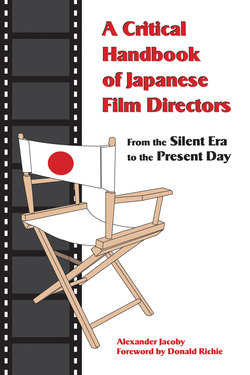Читать книгу A Critical Handbook of Japanese Film Directors - Alexander Jacoby - Страница 33
На сайте Литреса книга снята с продажи.
HORIKAWA Hiromichi
Оглавление(b. December 28, 1916)
堀川弘通
Akira Kurosawa’s assistant on numerous films including Ikiru (1952) and Seven Samurai (Shichinin no samurai, 1954), Horikawa has never achieved his mentor’s fame. Kurosawa himself scripted his directorial debut, A Story of Fast-Growing Weeds (Asunaro monogatari, 1955), about an adolescent and the first three women in his life. A concern with youthful experience was also visible in Horikawa’s second and third films, Summer Eclipse (Nisshoku no natsu, 1956), a taiyōzoku (“sun tribe”) film based on a Shintarō Ishihara novel, and The Last Day of Oishi (“Genroku Chūshingura: Ōishi saigo no ichinichi” yori: Koto no tsume, 1957), a reworking of the Chūshingura story that focused particularly on the youngest of the participating ronin and his fiancée. Another retelling of a classical Japanese story was the Chikamatsu adaptation Oil Hell Murder (Onnagoroshi abura jigoku, 1957), but Horikawa returned to contemporary subject matter with The Naked General (Hadaka no taishō, 1958), a portrait of mentally handicapped collage artist Kiyoshi Yamashita. In this darkly humorous account of a stubborn non-conformist, Horikawa touched for the first time on the subject of World War II, ironically showing how the artist’s apparent madness enabled him to escape the draft. The melodrama Eternity of Love (Wakarete ikiru toki mo, 1961), tracing a woman’s unhappy marriages and affairs, also unfolded against a wartime backdrop.
During the sixties, Horikawa made several thrillers: the socially conscious aspects of these films suggest the continuing influence of Kurosawa while also evoking Masaki Kobayashi, whose regular actor Tatsuya Nakadai appeared in The Blue Beast (Aoi yajū, 1960) and Pressure of Guilt (Shiro to kuro, 1963). The former charted the rise and fall of a low-ranking executive who exploits both labor and management, while the latter was a tangled psychological thriller about an attorney who, having strangled his lover, faces a moral dilemma when another man confesses. Later, Goodbye Moscow (Saraba Mosukuwa gurentai, 1968) used the relationship between a Japanese jazz pianist, an American soldier on leave from Vietnam, and a group of young Russian dissidents as a metaphor for Japan’s situation in the Cold War era. The Militarist (Gekidō no Shōwashi: Gunbatsu, 1970) was a critical biopic of General Tōjō, which dramatized the military coup of February 26, 1936, while Sun Above, Death Below (Sogeki, 1968) was a conventional if snappily edited thriller about a doomed hitman.
By this time, Horikawa was considered Toho’s most reliable director of prestige material, but his seventies work was less noteworthy. He continued to deal with youthful experience in Have Wings on Your Heart (Tsubasa wa kokoro ni tsukete, 1978) and Song of Mutsuko (Mutchan no uta, 1985), both tragedies about terminally ill children. The latter again had a wartime backdrop, as did Horikawa’s last films: War and Flowers (Hana monogatari, 1989) was another account of female experience during the war years, while Asian Blue (Eijian Burū: Ukishima Maru sakon, 1995) focused on the sufferings of Korean forced laborers, in particular those killed in the sinking of a ship carrying them home after Japan’s surrender. Though Horikawa worked consistently with interesting subject matter, his films seem to have been imperfectly realized: Anderson and Richie condemned A Story of Fast-Growing Weeds for not fully developing Kurosawa’s script, Tadao Satō found Goodbye Moscow sentimental despite its political interest, and Joan Mellen criticized The Militarist for political naivety. Nevertheless, some of Horikawa’s films were considered worthy of foreign distribution in the sixties, and they may still merit revival.
1955 Asunaro monogatari / A Story of Fast-Growing Weeds / Growing
Up
1956 Nisshoku no natsu / Summer Eclipse
1957 “Genroku Chūshingura: Ōishi saigo no ichinichi” yori: Koto no tsume / The Last Day of Oishi / Last Day of Samurai
Onnagoroshi abura jigoku / Oil Hell Murder / The Prodigal Son
1958 Hadaka no taishō / The Naked General
1959 Suzukake no sanpomichi / The Path under the Plantanes
1960 Kuroi gashū: Aru sararīman no shōgen / The Lost Alibi / Black Book of Paintings: Testimony of a Salaryman (lit.)
Aoi yajū / The Blue Beast
1961 Wakarete ikiru toki mo / Eternity of Love (lit. Even When We Live Apart)
Neko to katsuobushi: Aru sawashi no monogatari / Cat and Fish Flakes: Story of a Swindler
1962 Musume to watashi / My Daughter and I
1963 Shiro to kuro / Pressure of Guilt (lit. Black and White)
1964 Aku no monshō / Brand of Evil
Les Plus Belles Escroqueries du Monde / The World’s Greatest Swindles (co-director; international co-production released in Japan as Sekai sagi monogatari)
1965 Saigo no shinpan / Last Judgement
Ore ni tsuite koi / You Can If You Try / Follow Me
1968 Saraba Mosukuwa gurentai / Goodbye Moscow / Farewell to the Gang in Moscow (lit.)
Sogeki / Sun Above, Death Below (lit. Sniper)
1969 Haha to musuko no taiwa / Dialogue between Mother and Son (short)
1970 Gekidō no Shōwa shi: Gunbatsu / The Militarist (lit. History of Showa-Era Turbulence: Military Clique)
Gakuensai no yoru: Amai keiken / Night of the School Fete: Sweet Experience
1972 Anata wa kikijōzu? / Are You a Good Listener? (short)
1973 Ōshō / The Chess Master / The King
1975 Kokuso sezu / Not Accusing
Shin hakkenden / New Legend of Eight Samurai (co-director)
1976 Shōnen to sei / Elementary School Students and Sex (short)
1977 Arasuka monogatari / Alaska Story
1978 Tsubasa wa kokoro ni tsukete / Have Wings on Your Heart
1979 Kodomo wa jisatsu o yokoku suru / Warning Signs of Suicide in Children (short)
1981 Toshi wa tottemo… / Even Though We’re Getting Older (short)
1985 Mutchan no uta / Song of Mutsuko
1989 Hana monogatari / War and Flowers
1995 Eijian Burū: Ukishima maru sakon / Asian Blue
